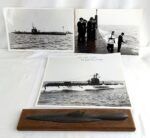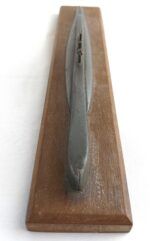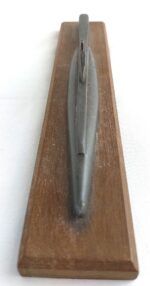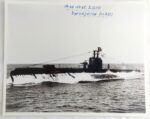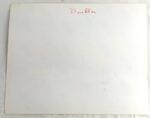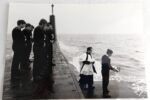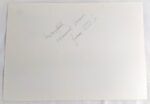*British, WW2, HMS Swordfish – Three Original Photographs and Model of S-Class Submarine on Wooden Base*
The brass model features an unnamed WW2 British submarine, likely S-Class, mounted on a wooden base. Accompanied by three original photographs of HMS Thule, one dated 1939 and one of the memorial service after being found by divers. These photographs originally formed part of the Lou Britton British Submarine Collection, which was acquired by the Royal Navy Submarine Museum, Gosport in 2007.
Photograph 1: Marked 1940-1945 S. Class. Swordfish Class
Photograph 2: Marked on reverse – Swordfish Weymouth Review 8/39
Photograph 3: Marked on reverse – Swordfish Memorial Service from Otus.
Approximate dimensions:
Wooden Base: 26.8cm long x 5cm wide x 1cm deep
Model: 23.5 cm long x 2.5cm wide x 3.2cm tall
HMS Swordfish (61S) was a first-batch S-class submarine commissioned in 1932 and assigned to the Royal Navy’s 2nd Submarine Flotilla. Designed for operations in the North and Baltic Seas, she featured six torpedo tubes, a 3-inch deck gun, and a range of 3,700 nautical miles on the surface.
At the start of World War II, Swordfish narrowly escaped friendly fire from her sister submarine HMS Sturgeon and engaged in multiple patrols, though with limited success. She attacked German convoys but missed her targets and survived depth charges, a drifting mine, and accidental bombing by a British aircraft. During her eighth patrol, she rescued the crew of a fleeing yacht before sinking it.
On November 7, 1940, Swordfish departed Portsmouth for her 12th patrol but never returned. Initially believed sunk by German destroyers, her wreck was discovered in 1983 off the Isle of Wight, split by a mine shortly after departure. The site is protected under the Protection of Military Remains Act 1986.
The Royal Navy’s S-class submarines were developed in the early 1930s to replace the H-class and patrol restricted waters like the North Sea and Mediterranean. The “S” in S-class submarines stands for “Small” or “Short-Range”, reflecting their design purpose, where their smaller size and range made them highly effective. During World War II, they became the largest submarine class built for the Royal Navy, with 62 constructed over 15 years, including 50 “improved” versions launched between 1940 and 1945. At the war’s start, the S class was among the most advanced submarine designs, alongside the British U and T classes, Dutch O 21 class, and German Type VII. Of the twelve S-class boats that were in service in 1939, only three survived to see the end of World War II.
*Condition*
Good used condition. Minor marks to the photographs and model commensurate with age and service. Please see photographs as part of the condition report.
RQMAEOXBDO_3246192039














